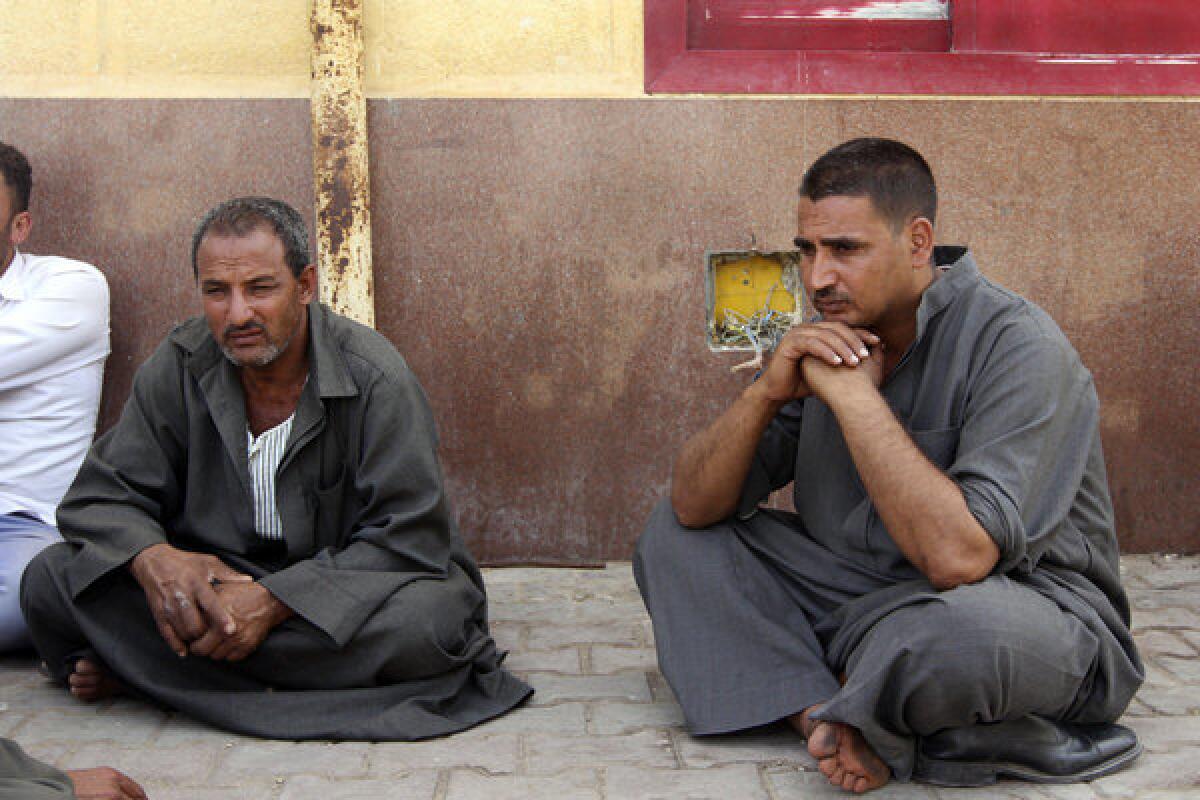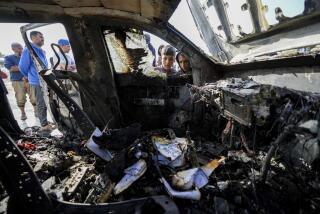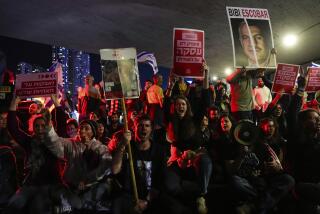Supporters of abducted soldiers keep Sinai-Gaza border shut

CAIRO — The families and colleagues of seven Egyptian soldiers who were kidnapped last week in North Sinai kept Egypt’s borders with the Gaza Strip closed Sunday for the third day in a row.
Nearly 170 demonstrators have gathered inside the walls of the Rafah border crossing to demand the hasty rescue of the seven, vowing to remain in place and increase in numbers until their return.
“We swore we would not open this crossing or leave this place until these soldiers come back, whether dead or alive,” said Osama Ali, one of the officers participating in the sit-in. “We have enough amenities, food and water that would last us a month even if they close down the port with us inside.”
Local news reports said the soldiers’ captors, who have not been officially identified, are demanding that the authorities release at least six fellow tribesmen convicted for an attack on the Arish city police station in July 2011. The soldiers were abducted Thursday night.
Interior ministry officials denied willingness to negotiate with the captors, according to Egyptian state media. They said efforts are continuing to determine the soldiers’ whereabouts with the aid of tribal leaders in the area.
Egypt’s presidency also declared it is closely monitoring the developing situation. President Mohammed Morsi met with the country’s Interior and Defense ministers as well as the head of general intelligence on Saturday to discuss ways to secure the soldiers’ quick and safe release, according to a statement issued by his office.
However, demonstrators said the authorities have been anything but helpful, concerned only with the problems created by keeping the borders sealed, such as a reported backlog of thousands of Palestinian travelers, including a delegation of Hamas officials who had been in Cairo earlier last week to resume the Egypt-sponsored talks with Fatah.
“Officials come over to us [at the crossing] to tell us they know where the soldiers are but can’t go there and get them,” said Ali, the officer. “Any official that visits us wants to negotiate to open up the port, but the soldiers are not really on their minds.”
The officer said security officials also threatened to use force against the demonstrators to expel them from the crossing area and reopen the border. He added that the demonstrators are also armed and willing to defend themselves if need be but said it would be “catastrophic” if the situation escalates into an armed confrontation with other Egyptian soldiers.
Those seeking to avoid the authorities in the Sinai take refuge in well-concealed mountainous areas where security forces are uninvited and could be met with violence.
“We are willing to go and get them,” Ali said. “I tell [officials] just tell us where they are and we will take our weapons and get them.”
The Sinai Peninsula, a volatile border area dominated by tribal laws, has witnessed much conflict in the period following the January 2011 uprising. Last August, 16 Egyptian security personnel were killed by unknown assailants at a checkpoint along the Egypt-Israel border. At least four others died in similar attacks in June and July 2012 but no one was held accountable.
“The state of security [in Egypt] is generally unstable,” said Sameh Saif El Yazl, the director of the Gomhoreya Center for political and strategic studies. “Sinai’s security is suffering the worst out of all Egypt’s 27 governorates, and in the north especially more than the south.”
El Yazl said that the presence of militant Islamist movements in the North Sinai province has further complicated matters. Several news reports suggested that such jihadist groups are behind the abduction, seeing as many of their members had also been connected to the attacks on the Arish police station.
But the return of police forces to Egypt’s streets was not a welcome event in North Sinai, given the bitter history between locals and the Interior ministry under ex-President Hosni Mubarak and former Minister Habib El Adly. Many believe they have reason to exact revenge, locals said.
“The security apparatus does not respect tribal traditions or customs. We have always been regarded as shepherds, drug traffickers or spies for Israel,” a member of Sinai’s Aleiqat tribe had told the local daily Ahram Online. “After the revolution you find psychological reasons for [tribesmen’s] desire for vengeance.”
ALSO:
Fears grow of clash between Israel and Syria
North Korea missile launches follow months of threats [Timeline]
Anti-Taliban Afghan police chief gunned down in motorcycle attack
More to Read
Start your day right
Sign up for Essential California for news, features and recommendations from the L.A. Times and beyond in your inbox six days a week.
You may occasionally receive promotional content from the Los Angeles Times.






